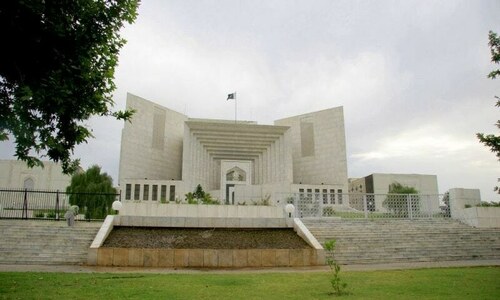ISLAMABAD: The Supreme Court on Tuesday sought the record of high-profile cases during the past 23 years — from 1999 to 2022 — from the National Accountability Bureau (NAB).
A three-judge Supreme Court bench, headed by the CJP, was hearing the challenge filed by PTI Chairman and former prime minister Imran Khan against the amendments to the National Accountability Ordinance, 1999 — the law which regulates the NAB.
While ordering Additional Prosecutor General (APG) NAB Mumtaz Yousuf to furnish the details, the CJP remarked there were good and bad sides to the accountability watchdog’s law.
There are many good things about the NAB, but at the same time government servants were targeted and later acquitted after spending a considerable period in jail, while many businessmen were disappointed due to the treatment at the hands of the bureau, he added.
Justice Ijazul Ahsan asked NAB APG to provide the details of investigations conducted against the accused and the status of cases that were returned to the bureau by the accountability courts after the amendments.
Justice Syed Mansoor Ali Shah directed APG NAB Yousuf to furnish details about the largest conviction upheld by the superior courts.
Earlier, the chief justice emphasised on the importance of the accountability process, saying that it was necessary for a healthy state and society.
However, he lamented the presence of mafia’s in Pakistan and said: “When there is no implementation of law, it encourages mafias. I do not want to name any[one] but we have violent, non-violent, corrupt and non-corrupt mafias.”
The observation came when counsel Khawaja Haris Ahmed, representing the petitioner, cited the precedent set in the 2012 ‘Mohammad Yasin case’ to establish that the state was under obligation to provide safeguards and ensure effective protection of the assets of the country through good governance since good economic policies protects the rights of the people.
However, the counsel argued that the amendments have left several ambiguities in the definition of benamidars.
Justice Shah, while pointing towards the counsel, wondered if the apex court could design a law or judge the definition of benamidars.
He also asked if the court strikes down a law, would it mean that the previous law which was amended stood revived.
Meanwhile, CJP Bandial, while expressing concerns over the economic situation, said debts have made Pakistan “helpless” and its economic sovereignty has been affected due to extraordinary expenses.
He observed that the court cannot dictate or direct not to take loan, though it can only ensure that competent people should make decisions concerning the economic wellbeing of the country.
In an apparent reference to one of the amendments, the chief justice asked how it could be decided whether Rs500 million or Rs100 should be the threshold to attract the applicability of the NAB laws.
Justice Shah also cited the example of China where ‘those accused of embezzling national wealth were put before the firing squad’ and wondered if an ordinary person can plead that since their fundamental rights were breached due to the corrupt practices therefore the culprits should be hanged.
“I have a difficulty in understanding the direct nexus of a citizen and his fundamental rights with the amendment to the accountability law,” he remarked, while wondering whether the counsel was attributing malice on the parliament’s part which amended the law.
The counsel, however, replied that he was not attributing any malice but called it “a colourable exercise of jurisdiction” and said that “a big fraud had been committed through the amendment” without understanding its ramifications.
At this point, Justice Shah cited the example of the November 2019 case relating to the extension to Army Chief Gen Qamar Javed Bajwa and recalled how the court asked the parliament to look into it and prescribe the age limit of the army chief’s retirement.
“The court did not strike down the law rather observed […] the parliament should make the law about granting extensions to army chiefs,” Justice Shah said.
“In the present case, can we ask the parliament to improve [the] law since the court was not satisfied by making it more onerous and strict.”
Justice Ahsan added that even the Financial Action Task Force has pointed out loopholes in the country’s accountability laws and said, “Since we live with the international community, we have to ensure that our accountability laws should be in juxtaposition of the international laws.”
Published in Dawn, October 12th, 2022













































